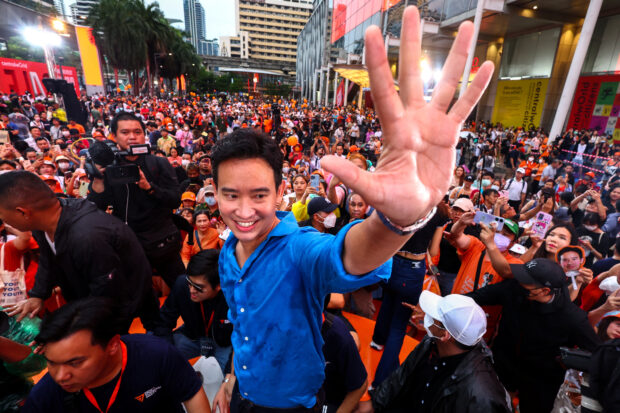Thai parliament votes for PM with reformist frontrunner facing hurdles

Bangkok, Thailand — Thailand’s parliament will vote for a prime minister Thursday, with reformist frontrunner Pita Limjaroenrat reeling from a barrage of hurdles that could undo his bid for the premiership.
The coalition bloc led by Pita’s Move Forward Party (MFP) will face off against more established parties and junta-appointed senators, spooked by the progressives’ shock election victory in May and their determination to amend Thailand’s strict royal defamation laws.
On a day of high political drama Wednesday, Pita was hit with the threat of parliamentary suspension as well as the Constitutional Court’s acceptance of a case accusing him and his party of attempting to overthrow the monarchy.
Despite the MFP’s win at the polls, with Thais rejecting the government of General Prayut Chan-o-cha who seized power in a 2014 coup, the party’s chances of forming a government with Pita at its head look increasingly slim.
He faces resistance from a military-appointed, 250-member bloc in the senate because of his party’s push to reform section 112 of Thailand’s criminal code which bans defaming or insulting the royal family.
His plans to shake up the country’s powerful business monopolies have also sparked concern.
Despite the series of obstacles thrown in his way on Wednesday, Pita told reporters he was in “good spirits”.
He also said of Thursday’s parliamentary vote that “the process tomorrow continues as planned”.
Pita’s eight-party coalition, which includes runners-up Pheu Thai, has 312 seats but is short of the 376 needed across both houses of parliament to claim the prime ministership.
On Tuesday, now-caretaker PM Prayut — whose United Thai Nation party came a dismal fifth in the May elections — announced his retirement from politics, although he will remain as premier until a new prime minister emerges.
Constitutional court cases
On Wednesday, the Election Commission recommended Pita’s suspension from parliament over allegations he broke campaign rules — a move that the MFP branded as an “abuse of power”.
The recommendation followed a probe around Pita’s ownership of shares in a media company, prohibited under Thai law.
Pita has said he inherited the shares in the iTV television station, which has not broadcast since 2007, from his father and denies any wrongdoing.
The announcement could convince senators on the fence to vote against him, said analysts.
Prinya Thaewanarumitkul, assistant law professor at Thammasat University, told AFP it was hard to see why the commission was in “such a hurry” to issue its recommendation.
“I can think of only one reason, this action is to meant to affect the result of tomorrow’s vote,” he said on Wednesday.
Should Pita lose the first vote, the house speaker will table session after session until a PM emerges — raising the spectre of weeks of deadlock and economic uncertainty.
‘Anything is possible’
The kingdom has endured a dozen coups in the past century, with political instability a regular danger and progressive movements often abruptly curtailed.
May’s election was the first since huge pro-democracy demonstrations swept the capital Bangkok in 2020, when tens of thousands of people made unprecedented calls to reform the royal defamation laws.
Pita’s MFP was the only party during campaigning to promise to tackle the issue.
But in another upset for the MFP on Wednesday, the Constitutional Court accepted a case alleging that their promises on the campaign trail to amend the legislation amounted to attempting to “overthrow” the constitutional monarchy.
It gave the party two weeks to present their defense.
The uncertainty may bring already-existing divisions within the MFP-led coalition to the fore, as alternative PM candidates are suggested.
Paetongtarn Shinawatra, daughter of exiled ex-leader Thaksin Shinawatra, was the face of Pheu Thai during the election campaign.
Business leader Srettha Thavisin of Pheu Thai is also seen as a potential alternative candidate.
Napisa Waitoolkiat, a political analyst with Naresuan University, told AFP that it appeared less and less likely that Pita would become the premier.
But she added: “Anything is possible in Thailand.”